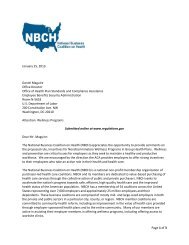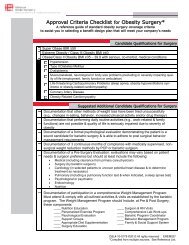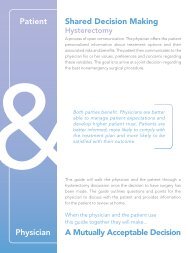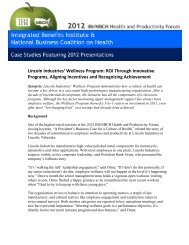Obesity/Weight Management Employer Survey and Interview Project
Obesity/Weight Management Employer Survey and Interview Project
Obesity/Weight Management Employer Survey and Interview Project
- No tags were found...
You also want an ePaper? Increase the reach of your titles
YUMPU automatically turns print PDFs into web optimized ePapers that Google loves.
<strong>Employer</strong> Ranking for Importance of EmployeeSafety. <strong>Employer</strong>s are most concerned with improvingthe health <strong>and</strong> safety of their employees, as well as thereducing the costs involved with poor health (direct<strong>and</strong> indirect for medical <strong>and</strong> productivity).E Small employers (86%) assigned slightly higherimportance than mid-size (83%) or large (79%)employers to the need for information related todirect medical cost.E Small (86%) <strong>and</strong> mid-size (85%) firms also assignedslightly higher importance than large employers(74%) to information related to work productivity<strong>and</strong> health.E Regardless of employer size, all employers areconcerned with the safety of their employees <strong>and</strong>reported that information regarding employeessafety is important (Figure 9)Interestingly, the 5th highest average score was givento creating a culture of health. This indicates thatemployers underst<strong>and</strong> that leaders need to promotetheir programs — whether within safety, wellness, orhealth care benefits — using multiple strategies <strong>and</strong>integration such as employing workforce-wide policy<strong>and</strong> environmental support interventions that are moreimpactful that single interventions. Larger employerswere slightly more likely (large — 82% <strong>and</strong> very large —85%) than very small (73%) <strong>and</strong> small (80%) employersto ascribe a high level of importance to information oncreating a culture of health.Issue Importance, <strong>Employer</strong> Role, <strong>and</strong> Information.<strong>Employer</strong>s were also asked about their level ofagreement with a series of statements about theirlevel of knowledge <strong>and</strong> strategies regarding obesityprevention <strong>and</strong> control in the workplace (Figure 10).The strongest agreement came in response to thefollowing statements, shown by weighted average(5 = highest score):E 4.19 - Addressing overweight is an important issue.E 3.90 - <strong>Employer</strong>s also believe they have a role toplay in finding effective solutions.E 3.77 - Availability of tools <strong>and</strong> information for thegeneral health of employeesE 3.66 - Availability of tools <strong>and</strong> informationspecifically for weight management.E 3.63 - Importance of community-basedorganizations <strong>and</strong> partnershipsE 3.54 - Underst<strong>and</strong>ing of the causes <strong>and</strong> drivers ofobesityE 3.49 - Health of the broader community isimportant.<strong>Employer</strong>s are less certain that they underst<strong>and</strong>the causes <strong>and</strong> drivers of overweight/obesity inthe workplace <strong>and</strong> have information necessaryto make organizational decisions to inform theFigure 9: <strong>Employer</strong> Ranking for Importance of Employee Safety1009080706050403020100Not ImportantNeutralImportantTotalVery Small Midsize Very Large14National Business Coalition on Health









